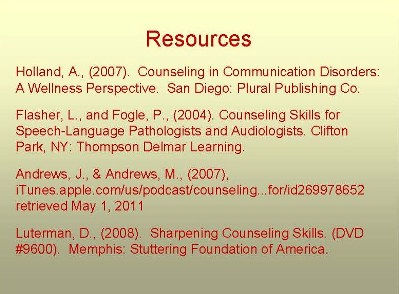This text-based course is a written transcript of the course, "Counseling and Communication Disorders: Dealing with Feelings and Emotions,” presented by Dr. Michael Flahive on June 20, 2011.
>> Amy Natho: Welcome to the SpeechPathology.com e-learning Expert Seminar entitled “Counseling and Communication Disorders: Dealing with Feelings and Emotions,” by Dr. Michael Flahive. My name is Amy Natho and I'll be your moderator for this online course. At this time it is a great pleasure and very much an honor to introduce Michael Flahive. Michael Flahive, Ph.D., is a 40-year member of the profession, holding clinical certification in both speech-language pathology and audiology. He's a University Professor that has provided clinical services across his work career. Areas of interest include counseling, aural rehabilitation, issues of professional preparation, and the applications of technology in our work. Dr. Flahive is a fellow of ASHA. So thanks very much, Mike, we're really happy that you could be here today.
[Applause]
>> Michael Flahive: I appreciate the opportunity to share some thoughts with you today and hope that as we move forward there are some points of stimulation as well as some information that may be novel. Dealing with feelings and emotions is certainly a component that is out there and an essential piece of what we appreciate about the communication disorders that come before us. In looking at organizing ourselves, I would like very early on to identify several of the resources that have been helpful in putting today's presentation together. More importantly, they may be helpful to you as you and your colleagues - I'm speaking now to each of you individually - as you all move forward from today looking perhaps to enhance your degree of experience, perhaps revisiting notions of counseling to see that your gain remains a solid one.
So now, the business about getting better or maintaining skills and perhaps refining them is something that we'll mention several times as we move along. We're doing this in part because our scope of practice and code of ethics make reference to communication counseling. It is a behavior, a set of behaviors, that we've had purview to for quite some time. We're interested in optimizing service provision, I believe, as a major piece of our responsibility to those whom we serve. That includes individuals and the reactions that they or their family members may have to the communication impairment that they're facing.
At the same time, of course, we need to be cognizant and appreciate the skill that we bring and limitations that we may have. At this point, very early in our time together, I would make the point to you that we need to face any of the persons whom we serve at any time and acknowledge that perhaps we've reached a limit. We ought to feel comfortable in providing service and acknowledge when we've gone beyond, or that we are at a point where we need to refer to someone else. That's not to say we can't do, but that our particular expertise may have been exhausted.
Today’s Key References
Here are some suggestions about moving forward. Important to our work, I think, is that we have a sense about why it is we do the things we do. Let's look at this list, if you would, because this is where today's conversation comes from:

Audrey Holland's text is really the major resource that I rely on, in part because it is terribly well written. It is in many ways a conversation with the good Dr. Holland. Her writing style is reader friendly, and it very much represents or resonates with where I come from personally. It’s kind of a Bible that I refer to frequently.
The Flasher and Fogle text, while a couple of years older, does have some very nice descriptions of some of the behaviors that we will want to have in our repertoire. It also provides some very direct talk about addressing different populations and particularly, dealing with conversations that may be challenging. There is a Flasher and Fogle edition number two that I see has a 2012 publication date, so it is close to being released and might serve as something that small groups may care to work with. There are, at the end of each of the chapters, simulation suggestions, so that if groups are interested in doing some practice, there are some activities built in.
